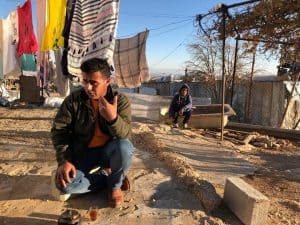
Over the course of the next few weeks the fate of DACA recipients—the “Dreamers”—hangs in the balance. When interviewed about these developments on the nightly news, Dreamers lament being seen and used as a political football. We must not add to their pain and uncertainty.
We often do good things with questionable motives. But Jesus does not approve of this kind of seemingly well-intentioned behavior: “For I tell you that unless your righteousness surpasses that of the Pharisees and the teachers of the law, you will certainly not enter the kingdom of heaven” (Matthew 5:20). A smug self-righteous attitude is particularly noxious in our efforts to fight social injustice. Here the territory is filled with justifiable moral outrage, but this outrage can easily slip into self-righteousness.
A smug self-righteous attitude is particularly noxious in our efforts to fight social injustice.
A woman in a Starbucks in Boston reminded me of this fact. I grew up in South Korea, the son of medical missionaries. We were accustomed to a constant barrage of beggars and panhandlers; you never went anywhere as an American shortly after the Korean War without being confronted by them. I took it upon myself as a spiritual discipline to always give something, rather than looking away. It was particularly the religious types who “pass by on the other side of the road,” blind and lacking empathy, in Jesus’ parable about the Good Samaritan. Jesus’ pattern, in contrast, was to see the need, feel compassion, and then act. I even gave a couple of dollars to a man in Dallas once who held up a sign reading, “Need Money for Beer.”
So one day I was sitting in the Starbucks on Boston Commons when a woman entered and began systematically asking every patron for money—it’s a good assumption that anyone willing to spend $4.00 on a cup of coffee could spare some change for the hungry and homeless. I was prepared. I reached into my wallet and gave her some money. Feeling good about myself, I returned to my coffee and newspaper.
A few minutes later, after she had finished her rounds, the woman returned to me and said, “Thank you…and my name is Sally.” It was a sharp and immediate rebuke from the Lord. This woman was not a social action project nor a spiritual discipline. She was a person with a history and a name. I had been transactional in my exchange, which she reminded me, gently, is not the same as compassion.
The 800,000 Dreamers need our prayers, but not as a political football. My recommendation is to get the name of a Dreamer, or a list of names, and pray for him or her or them by name each day. Social justice is love expressed publicly. In all our efforts let us try to be as personal and incarnational as possible. Dreamers are not a public policy problem or a social justice agenda; they are individuals with a history and a name.
“Thank you…and my name is Sally.”
John Seel is a consultant, writer, cultural analyst, and cultural renewal entrepreneur. He is the founder of John Seel Consulting LLC, a social impact consulting firm working with people and projects that foster human flourishing and the common good. The former director of cultural engagement at the John Templeton Foundation, he is a national expert on millennials and the New Copernicans. He has an M.Div. from Covenant Theological Seminary and a Ph.D. in American Studies from the University of Maryland (College Park). He and his wife, Kathryn, live in Lafayette Hill, PA. He directs the New Copernican Empowerment Dialogues at The Sider Center at Eastern University. This post originally appeared on his blog, New Copernican Conversations.


